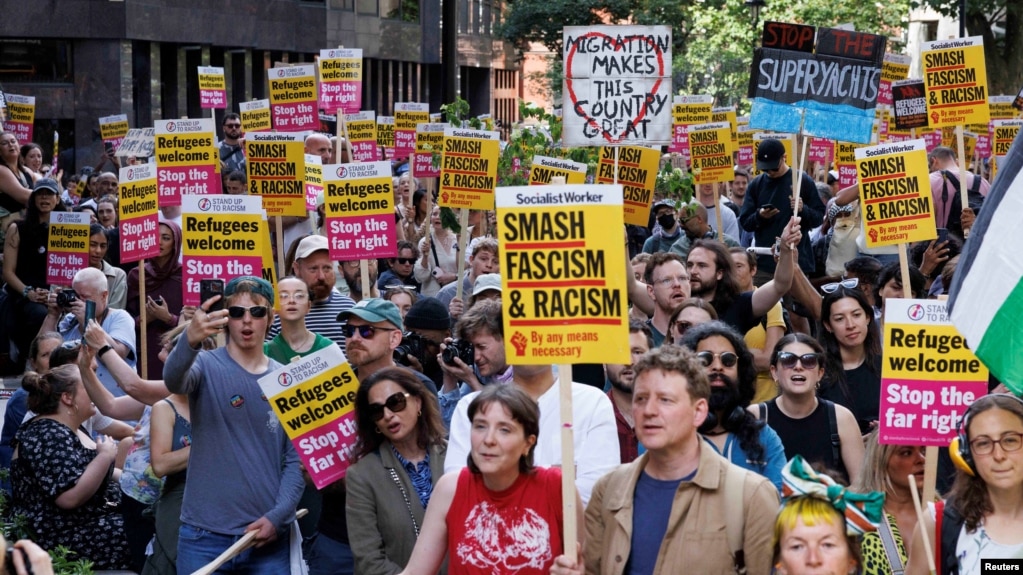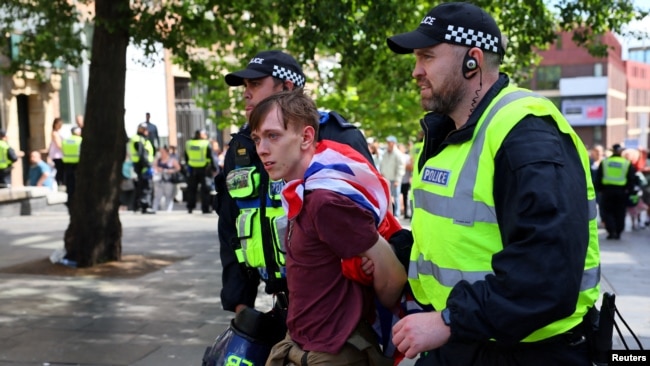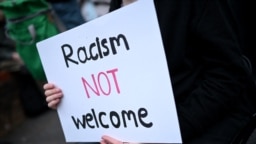‘What can pro-Israel entities gain from backing Tommy Robinson?’ A lot
August 14, 2024

Tommy Robinson addresses the rally from a stage in Parliament Square in London, England on June 1, 2024 [Guy Smallman/Getty Images]
by Nasim Ahmed
Nasimbythedocks


“What can pro-Israel entities gain from backing Tommy Robinson?” asks John Ware in an article this week. “Absolutely nothing,” says the British journalist, dismissing the series of allegations that the far-right agitator, who many hold responsible for the recent riots across the UK and anti-Muslim pogroms, is funded by Zionist groups.
Ware goes on to describe proponents of these claims as engaging in conspiratorial thinking, implying that anyone making a connection between far-right leaders sowing hate and division on the streets of Britain and Zionist leaders are anti-Semites peddling in conspiracy theories about Jewish puppet masters controlling the world.
Ware, who is no stranger to controversy, having produced the contentious BBC Panorama programme on alleged anti-Semitism in the Labour Party and accused by his critics of stoking a witch-hunt against British Muslims, mentions Dr Anas Altikriti. The CEO and Founder of The Cordoba Foundation repeated widely shared claims that Robinson and his financiers are linked to the Zionist state of Israel and that the far-right protest on British streets were retribution for British solidarity with Palestinians in Gaza.
Altikriti is one of several people on Ware’s list described as having a “conspiratorial take on the root causes of the riots.” He cites Massoud Shadjareh, Chair of the Islamic Human Rights Commission. MEMO contributor, Yvonne Ridley, and comments made by the British journalist describing Robinson as “Israel’s poster boy”. David Miller, a former professor, who called Robinson a Zionist asset working for Israel since 2009, and rapper, Lowkey, who suggested Robinson’s actions were part of a Zionist agenda.
Exposed: what links Israel to UK far-right riots?
Ware does acknowledge that Robinson has an affinity with Israel. But the support of the far-right leader for the apartheid state, according to Ware, is a “way of weaponising his bigotry against Muslims” rather than any genuine alliance with Zionism. He points out that mainstream UK Jewish organisations have condemned Robinson and the far-right violence unequivocally. For instance, the Board of Deputies condemned the lawlessness and thuggery, while the Chief Rabbi, Sir Ephraim Mirvis, highlighted the moral stain from targeting mosques, asylum seekers and refugees.
It is, perhaps, understandable why Ware would jump to the defence of Israel from allegations that some of the worst actors in our society are spearheading its cause. Given his own well-documented support for Israel and having also funded projects in the apartheid state, would I want a cause to which I am deeply committed to, be associated with a man accused of spearheading anti-Muslim pogroms?
Ware, however, does an extremely poor job in making his argument. At no point does he challenge the actual evidence for why Robinson is called a Zionist asset. Surely, if the aim is to debunk that claim you would spend more time explaining the well-documented funding of a far-right agitator like Robinson by Zionist anti-Muslim groups and less time smearing critics. At no point does Ware refute the evidence cited as proof that Robinson is a Zionist asset.
Both can be true: some sections of the pro-Israeli community, as Ware pointed out, despise Robinson and what he stands for, while other sections of the global Zionist community see him – and the far-right, in general – as allies in a broader civilisational conflict with Muslims. I think that would have been a reasonable position. But Ware appears to discount that as a possibility.
Perhaps Ware missed the article about Robinson published in the Time of Israel four years ago asking “why are US ‘pro-Israel’ groups boosting a far-right, anti-Muslim UK extremist?” The revealing piece uncovers the very connections between Robinson and various pro-Israel groups and individuals that Ware dismisses as conspiracy.
According to the 2019 investigation, Robinson is said to have received significant financial and ideological support from The Middle East Forum (MEF), a Philadelphia-based think tank, long known for its pro-Israel and anti-Muslim stance. MEF has been one of Robinson’s biggest sponsors. MEF’s president, Daniel Pipes, reportedly confirmed that his organisation spent approximately $60,000 on three demonstrations supporting Robinson during his legal trials.
The Times of Israel report also mentions Robert Shillman, described as a US-based ultra-Zionist billionaire, who frequently donates to Israeli institutions. Shillman reportedly financed a fellowship that paid for a position Robinson held in 2017 with the Rebel Media, a right-wing Canadian website. Other organisations, including the Gatestone Institute and the David Horowitz Freedom Centre, have published articles defending Robinson. These groups have long been known as major players in the global anti-Muslim industry.
Many of the organisations cited are part of the American right-wing infrastructure that supports Israel. Nina Rosenwald, described as an “ardent Zionist” and American-Jewish philanthropist, reportedly funds both MEF and the Gatestone Institute. Pipes, when interviewed, expressed an affinity with Robinson based on shared concerns about what he termed “the Islamist threat”. Pipes suggested that people concerned about Israel’s security often share concerns about Muslims.
Did Ware also miss the 2018 Guardian report which uncovered ties between Robinson and Zionist anti-Muslim pro-Israel groups? On its list of donors and supporters of Robinson, it too cites MEF spending around $60,000 on legal fees and demonstrations in London. Apparently a senior MEF executive was also closely involved in preparations for a pro-Robinson march.
Commenting on Shillman, the Guardian said that the Zionist billionaire played a crucial role in Robinson’s financial support and listed ways in which he helped pay for Robinson’s employment. Other organisations have contributed to Robinson’s cause. The Australian Liberty Alliance, a small right-wing group, is said to have provided funding, though the amount was not disclosed. Support by previously mentioned the Gatestone Institute, DHFC in California, are on the Guardian list. The DHFC has also lobbied for Robinson to address US politicians.
These organisations are well-funded by influential right-wing donors that are deeply and ideologically wedded to Israel. Tax returns examined by the Guardian show that, between 2014 and 2016, they received almost $5 million from several millionaire donors. The MEF received $792,000 from a foundation led by Nina Rosenwald, while the DHFC received over $1.6 million from five wealthy benefactors. The Gatestone Institute received more than $2 million in donations, including $250,000 from the Mercer Family Foundation, which is run by one of Donald Trump’s top donors.
Ware’s article is a very poor attempt at playing the man and not the ball. To throw the question back to the journalist, “What can pro-Israel entities gain from backing Tommy Robinson?” The answer is far from “absolutely nothing” as Ware suggests. It is a lot and, judging by how long Zionist groups have been funding the far-right extremist who many hold responsible for the anti-Muslim pogroms in the UK, I bet it’s more than Ware would ever care to admit.

















